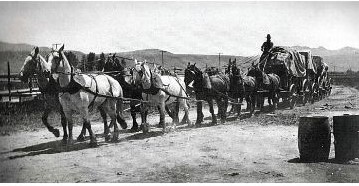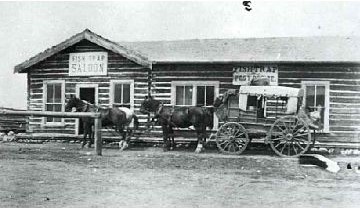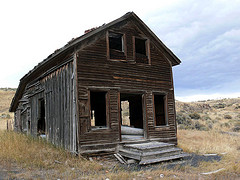|
Community/Town |
Referenced in: |
| Alamo
|
1906
Dillon, Montana directory |
| Alice |
1906
Dillon, Montana directory |
|
Allerdice |
1906
Dillon, Montana directory & History of Washington, Idaho
& Montana 1845-1889 |
|
Amesville |
1906 Dillon, Montana directory |
|
Apex |
1906
Dillon, Montana directory & History of Washington, Idaho
& Montana 1845-1889 |
|
Argenta |
Silver was first mined in the 1860's
and 1870's here. It is about 12 miles west of Dillon. |
|
Armstead |
Lewis and Clark Expedition traveled
past the future site of Armstead in 1805. The town was named for
miner Harry Armstead and was located in a narrow valley containing
the Beaverhead River. The town was originally a station stop
on the Union Pacific Railroad line from Idaho Falls to Butte. There
was a post office at Armstead from 1910-1939. When the Clark
Canyon Dam was created, the reservoir completely wiped out the site
of Armstead. Elevation 5,545'
|
|
Bannack |
Founded in 1862, and named for
the Bannock Indians. It was the capital of the Montana
Territory for a short time in 1864. Bannack had a major
gold discovery in 1862, and eventually became a ghost town.
About 10,000 residents resided in Bannack when the gold mining
was strong. One of the towns founders was Dr. Erasmus
Darwin Leavitt (from Cornish, NH) who later gave up medicine to
become a gold miner. Dr. Leavitt eventually went back to
becoming a physician and eventually moved to Butte, Montana.
Bannack elected Henry Plummer as
their sheriff. He was accused as secretly leading a
ruthless gang of bandits. Plummer and both deputies were
hanged without a trial by the Montana Vigilantes of Bannack.
The town has been declared a
National Historic landmark (1961) and is known as Bannack State
Park. |
|
Barrat's |
1906
Dillon, Montana directory & History of Washington, Idaho
& Montana 1845-1889 |
|
Beaverhead Rock |
History of Washington, Idaho &
Montana 1845-1889 |
|
Big Hole Basin/Wisdom
Site of the Aug 9-10, 1877 battle
with Nez Pierce. When the US Army had a 5 month war to put 1/3
of the Nez Pierce on a reservation.
The fighting began in the White
Bird Canyon in Idaho and ended in the Bear Paw Mountains of
Montana. National Battlefield designation.
Wisdom was named for the Wisdom
River, which was renamed the Big Hole River which passes through
the town. Current population about 100.
|

Freight arriving at Wisdom, MT in the early
1900s |

Fish Trap Stage, Big
Hole Valley, early 1900s, Courtesy USDA |
|
|
Blue Wing Mining Dist |
1906
Dillon, Montana directory |
|
Bonaccord |
1906
Dillon, Montana directory |
|
Bond
|
1906
Dillon, Montana directory |
|
Bowen |
1906
Dillon, Montana directory |
|
Briston |
1906
Dillon, Montana directory |
|
Burnt Pine |
History of Washington, Idaho &
Montana 1845-1889; and in 1876 Pacific Coast directory |
|
Cavendish |
1906
Dillon, Montana directory |
| Coolidge |
This was an area of silver
mining. A rich claim was found in 1872 by Preston
Sheldon who called his mine Elkhorn. Some of the
silver mines in the area
were
Critic, Fraction, Navajo, Good Enough, Park, Red Sky,
Hamburg, Washington, Guy, Last Chance, Cleopatra, Mascot
and Cleveland. Silver prices crashed in 1893.
Claim started to be bought up between 1906-1913.
Coolidge was started in 1914 with the town being named
for Calvin Coolidge. A narrow gauge railroad was added
from the Elkhorn mine to
Divide, Montana. A new mill was added in 1919.
Many moved away by the 1930's. It is now a "ghost
town" and has been abandoned. Most buildings have
fallen down. |
|
Crabtree |
1906
Dillon, Montana directory |
|
Darling |
History of Washington, Idaho &
Montana 1845-1889 |
|
Dell |
An unincorporated community, with a
post office, on the Big Sheep Road northwest of Lima. Also
mentioned in a History of Washington, Idaho & Montana 1845-1889. |
|
Dewey's Flat |
Named for David S Dewey in the mid
1870's in an area near the Big Hole River. It had a
population between 400 and 500 people between 1870-1890. The
town had 10 saloons. Also mentioned in a History of
Washington, Idaho & Montana 1845-1889. |
| Dillon |
Dillon, was named for
Sidney Dillon, who directed the completion of the
railroad line from Utah to Butte. Construction on the
Utah and Northern Railroad had suddenly come to a
standstill in 1880 when a rancher who owned the land
refused to give it up for a right-of-way. A few
enterprising men, thought to be Howard Sebree, John M
Lowell, William Wood and others, engaged in business at
or near the end of the terminus banded together and
bought the ranch and gave the railroad the right to go
through. They continued their partnership by executing a
trust deed on December 4, 1880, and the town of Terminus
was established. The name was later changed to Dillon in
March 1881. |
|
Edgerton |
History of Washington, Idaho &
Montana 1845-1889 |
|
Elkhorn |
1906
Dillon, Montana directory |
|
Faithfull Mine |
1906
Dillon, Montana directory |
|
Fairview |
History of Washington, Idaho &
Montana 1845-1889 |
|
Farlin |
1906
Dillon, Montana directory |
|
Fox |
1906
Dillon, Montana directory |
|
Garnet Mine |
1906
Dillon, Montana directory |
|
Gibbons Battlefield |
1906
Dillon, Montana directory |
|
Glen |
Unincorporated community with a
post office, on US Route 91, south of Melrose, north of Dillon.
Also mentioned in a History of Washington, Idaho & Montana
1845-1889 |
|
Glendale |
Town site started in 1880.
Silver Ore mines were first started in the area in 1872.
Located about 5 miles west of Big Hole River near modern day
Melrose. First lode was discovered in 1872 and the
original discovers were William Spurr and James A Bryant.
Now a ghost town.
|

Glendale |
|
|
Grant |
1906
Dillon, Montana directory |
|
Grayling |
History of
Washington, Idaho & Montana 1845-1889; 1906 Dillon
Montana directory |


